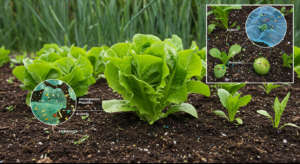 The micro‐ and nanoscale plastic particles in soil and water can greatly boost the uptake of toxic chemicals by both plants and human intestinal cells. Two new Rutgers Health studies provide the evidence:
The micro‐ and nanoscale plastic particles in soil and water can greatly boost the uptake of toxic chemicals by both plants and human intestinal cells. Two new Rutgers Health studies provide the evidence:
- In one study published in Nano Impact, lettuce exposed simultaneously to nanoscale plastics and pollutants (for example, arsenic) absorbed considerably more toxins than when exposed to the pollutants alone.
- A companion study published in the journal Microplastics found that human intestinal tissue showed similar increased uptake of toxic substances when plastics were present.
Together, these findings suggest that as plastics break down into micro- and nanoscale particles, they not only persist in the environment but also act as carriers that enhance the absorption of other harmful chemicals. This could create a cycle of contamination in our food chain, posing heightened risks for diseases—especially among vulnerable populations.
Source: Environmental News Network
